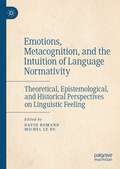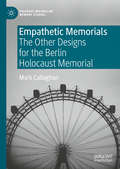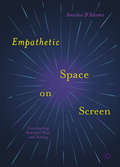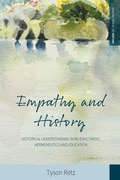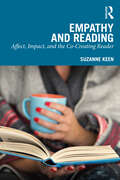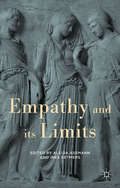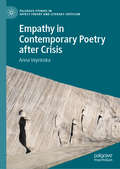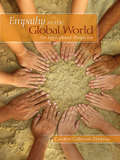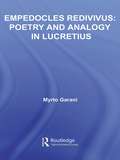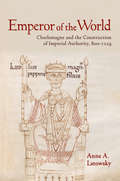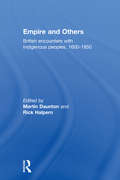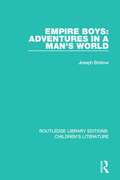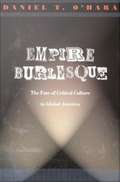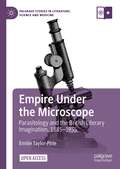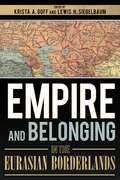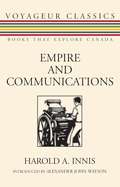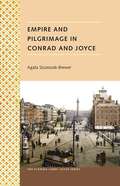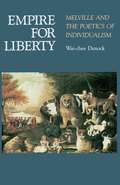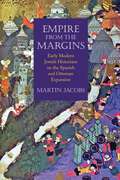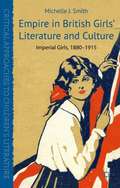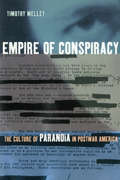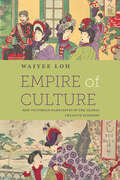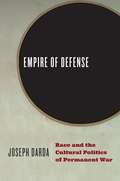- Table View
- List View
Emotions, Metacognition, and the Intuition of Language Normativity: Theoretical, Epistemological, and Historical Perspectives on Linguistic Feeling
by David Romand Michel Le DuThis book proposes a comprehensive discussion of the issue of linguistic feeling, the subject’s metalinguistic capacity to intuitively apprehend the normative – lexical, syntactic, morphological, phonological… – dimensions of a definite language he or she is acquainted with. The volume’s twelve contributions aim to revisit a concept that, through a fluctuating terminology (“Sprachgefühl,” “sentiment de la langue,” “linguistic intuitions,” etc.), had developed, since the late 18th century, within a variety of cultural contexts and research traditions, and whose theoretical, epistemological, and historical ins and outs had not been systematically explored so far. Beginning with a long opening chapter, the book consists of two parts, one tracing the multifaceted approaches to linguistic feeling from Herder to Wittgenstein, and one offering a representative overview of the debates about the issue at stake in current linguistics and philosophy, while addressing the question of the place of metacognition, normativity, and affectivity in language processes.
Empathetic Memorials: The Other Designs for the Berlin Holocaust Memorial (Palgrave Macmillan Memory Studies)
by Mark CallaghanThis book is a study of the Berlin Holocaust Memorial Competitions of the 1990s, with a focus on designs that kindle empathetic responses. Through analysis of provocative designs, the book engages with issues of empathy, secondary witnessing, and depictions of concentration camp iconography. It explores the relationship between empathy and cultural memory when representations of suffering are notably absent. The book submits that one design represents the idea of an uncanny memorial, and also pays attention to viewer co-authorship in counter-monuments. Analysis of counter-monuments also include their creative engagement with German history and their determination to defy fascist aesthetics. As the winning design for The Memorial to the Murdered Jews of Europe is abstract with an information centre, there is an exploration of the memorial museum. Callaghan asks whether this configuration is intended to compensate for the abstract memorial’s ambiguity or to complement the design’s visceral potential. Other debates explored concern political memory, national memory, and the controversy of dedicating the memorial exclusively to murdered Jews.
Empathetic Space on Screen
by Amedeo D'AdamoIn this book we learn that there is a clear but complex relationship between setting and character on screen. Certain settings stand out above others—think of the iconic gooey dripping tunnels that Ripley stumbles through in Aliens, Norman’s bird-decorated parlour in Psycho or the dark Gotham of certain Batman movies. But what makes these particular settings so powerful and iconic? Amedeo D’Adamo explains why we care about and cry for certain characters, and then focuses on how certain places then become windows onto their emotional lives. Using popular case studies such as Apocalypse Now, Amelie, Homeland and The Secret Garden, this original and insightful book is the first to really explain what makes some settings so effective, revealing an important but as yet uncovered machinery of empathy in visual narrative space. An invaluable resource for students, academics and indeed young filmmakers designing their very own narratives for space on screen.
Empathy and History: Historical Understanding in Re-enactment, Hermeneutics and Education (Making Sense of History #35)
by Tyson RetzSince empathy first emerged as an object of inquiry within British history education in the early 1970s, teachers, scholars and policymakers have debated the concept’s role in the teaching and learning of history. Yet over the years this discussion has been confined to specialized education outlets, while empathy’s broader significance for history and philosophy has too often gone unnoticed. Empathy and History is the first comprehensive account of empathy’s place in the practice, teaching, and philosophy of history. Beginning with the concept’s roots in nineteenth-century German historicism, the book follows its historical development, transformation, and deployment while revealing its relevance for practitioners today.
Empathy and Reading: Affect, Impact, and the Co-Creating Reader
by Suzanne KeenThis pioneering collection brings together Suzanne Keen’s extensive body of work on empathy and reading, charting the development of narrative empathy as an area of inquiry in its own right and extending cross-disciplinary conversations about empathy evoked by reading. The volume offers a brief overview of the trajectory of research following the 2007 publication of Empathy and the Novel, with empathy understood as a suite of related phenomena as stimulated by representations in narratives. The book is organized around three thematic sections—theories; empathetic readers; and interdisciplinary applications—each preceded by a short framing essay. The volume features excerpts from the author’s seminal works on narrative empathy and makes available her harder-to-access contributions. The book brings different strands of the author’s research into conversation with existing debates, with the aim of inspiring future interdisciplinary research on narrative empathy. This book will be of interest to students and scholars in such fields as literary studies, cognitive science, emotion studies, affect studies, and applied contexts where empathetic practitioners work.
Empathy and Reading: Affect, Impact, and the Co-Creating Reader
by Suzanne KeenThis pioneering collection brings together Suzanne Keen’s extensive body of work on empathy and reading, charting the development of narrative empathy as an area of inquiry in its own right and extending cross-disciplinary conversations about empathy evoked by reading. The volume offers a brief overview of the trajectory of research following the 2007 publication of Empathy and the Novel, with empathy understood as a suite of related phenomena as stimulated by representations in narratives. The book is organized around three thematic sections—theories; empathetic readers; and interdisciplinary applications—each preceded by a short framing essay. The volume features excerpts from the author’s seminal works on narrative empathy and makes available her harder-to-access contributions. The book brings different strands of the author’s research into conversation with existing debates, with the aim of inspiring future interdisciplinary research on narrative empathy. This book will be of interest to students and scholars in such fields as literary studies, cognitive science, emotion studies, affect studies, and applied contexts where empathetic practitioners work.
Empathy and its Limits
by Aleida Assmann Ines DetmersThis volume extends the theoretical scope of the important concept of empathy by analysing not only the cultural contexts that foster the generating of empathy, but in focusing also on the limits of pro-social feelings and the mechanisms that lead to its blocking.
Empathy in Contemporary Poetry after Crisis (Palgrave Studies in Affect Theory and Literary Criticism)
by Anna VeprinskaThis book examines the representation of empathy in contemporary poetry after crisis, specifically poetry after the Holocaust, the September 11, 2001 terrorist attacks, and Hurricane Katrina. The text argues that, recognizing both the possibilities and dangers of empathy, the poems under consideration variously invite and refuse empathy, thus displaying what Anna Veprinska terms empathetic dissonance. Veprinska proposes that empathetic dissonance reflects the texts’ struggle with the question of the value and possibility of empathy in the face of the crises to which these texts respond. Examining poems from Charlotte Delbo, Dionne Brand, Niyi Osundare, Charles Reznikoff, Robert Fitterman, Wisława Szymborska, Cynthia Hogue, Claudia Rankine, Paul Celan, Dan Pagis, Lucille Clifton, and Katie Ford, among others, Veprinska considers empathetic dissonance through language, witnessing, and theology. Merging comparative close readings with interdisciplinary theory from philosophy, psychology, cultural theory, history and literary theory, and trauma studies, this book juxtaposes a genocide, a terrorist act, and a natural disaster amplified by racial politics and human disregard in order to consider what happens to empathy in poetry after events at the limits of empathy.
Empathy in the Global World: An Intercultural Perspective
by Carolyn Calloway-ThomasThe first book to examine the nature, practices, and potential of empathy for understanding and addressing human problems on a global scale Violence and acts of hatred worldwide—from the bombing of the World Trade Center on September 11, 2001 to wars in Iraq, Afghanistan, Pakistan, Sri Lanka, Darfur, and Palestine—call attention to the critical importance of empathy in human affairs. Empathy in the Global World examines the role of compassion in decision making, how it is communicated via the media, and how it affects global problems such as poverty and environmental disasters. Ideal for undergraduate and graduate students, politicians, and reformers, this important work helps readers understand the workings of empathy—the bedrock of intercultural communication—as it demonstrates the importance of understanding the role of compassion in addressing international challenges.Key Features Offers historical and cultural analysis into an array of topics, from the genesis of empathy to 21st- century discourse and practices of the conceptTakes readers beyond existing ways of looking at empathy into such areas as geopolitics, global class issues, the world of NGOs, and national disastersExplores what it is like to grapple with terrorism, Israeli-Arab relations, and other audacious events that shape human thoughtClarifies and connects issues through stories and examples of empathetic and non-empathetic practices across a range of culturesIntended Audience Empathy in the Global World: An Intercultural Perspective is ideal for a wide range of courses, including Conflict/Negotiation/Mediation, Intercultural Communication, and Interpersonal Communication.
Empedocles Redivivus: Poetry and Analogy in Lucretius (Studies in Classics)
by Myrto GaraniDespite the general scholarly consensus about Lucretius’ debt to Empedocles as the father of the genre of cosmological didactic epic, there is a major disagreement regarding Lucretius’ applause for his Presocratic predecessor’s praeclara reperta (DRN 1.732). In the present study, Garani suggests that by praising Empedocles’ discoveries, Lucretius points to his predecessor’s epistemological methods of inquiry concerning the unseen, methods upon which he himself draws extensively and creatively enhances. In this way, he successfully penetrates into the invisible natural world, deciphers its secrets, and thus liberates his pupil from superstitious fears about death and physical phenomena. To justify this proposition, Garani undertakes a systematic analysis of Lucretius’ integration of Empedocles’ methods of creating analogies in the form of literary devices -- personifications, similes, and metaphors -- and demonstrates that his intertextual engagement with Empedocles’ philosophical poem is direct and intensive at both the poetic and the philosophical levels.
Emperor of the World: Charlemagne and the Construction of Imperial Authority, 800–1229
by Anne A. LatowskyCharlemagne never traveled farther east than Italy, but by the mid-tenth century a story had begun to circulate about the friendly alliances that the emperor had forged while visiting Jerusalem and Constantinople. This story gained wide currency throughout the Middle Ages, appearing frequently in chronicles, histories, imperial decrees, and hagiographies-even in stained-glass windows and vernacular verse and prose. In Emperor of the World, Anne A. Latowsky traces the curious history of this myth, revealing how the memory of the Frankish Emperor was manipulated to shape the institutions of kingship and empire in the High Middle Ages.The legend incorporates apocalyptic themes such as the succession of world monarchies at the End of Days and the prophecy of the Last Roman Emperor. Charlemagne's apocryphal journey to the East increasingly resembled the eschatological final journey of the Last Emperor, who was expected to end his reign in Jerusalem after reuniting the Roman Empire prior to the Last Judgment. Instead of relinquishing his imperial dignity and handing the rule of a united Christendom over to God as predicted, this Charlemagne returns to the West to commence his reign. Latowsky finds that the writers who incorporated this legend did so to support, or in certain cases to criticize, the imperial pretentions of the regimes under which they wrote. New versions of the myth would resurface at times of transition and during periods marked by strong assertions of Roman-style imperial authority and conflict with the papacy, most notably during the reigns of Henry IV and Frederick Barbarossa. Latowsky removes Charlemagne's encounters with the East from their long-presumed Crusading context and shows how a story that began as a rhetorical commonplace of imperial praise evolved over the centuries as an expression of Christian Roman universalism.
Empire And Others: British Encounters With Indigenous Peoples 1600-1850 (Critical Histories Ser.)
by Professor M Daunton Rick HalpernMuch has been written about the forging of a British identity in the 17th and 18th centuries, from the multiple kingdoms of England, Scotland and Ireland. But the process also ran across the Irish sea and was played out in North America and the Caribbean. In the process, the indigenous peoples of North America, the Caribbean, the Cape, Australia and New Zealand were forced to redefine their identities. This text integrates the history of these areas with British and imperial history. With contributions from both sides of the Atlantic, each chapter deals with a different aspect of British encounters with indigenous peoples in Colonial America and includes, for example, sections on "Native Americans and Early Modern Concepts of Race" and "Hunting and the Politics of Masculinity in Cherokee treaty-making, 1763-1775". This book should be of particular interest to postgraduate students of Colonial American history and early modern British history.
Empire Boys: Adventures In A Man's World (Routledge Library Editions: Children's Literature #2)
by Joseph BristowOriginally published in 1991. Focusing on ‘boys' own’ literature, this book examines the reasons why such a distinct type of combative masculinity developed during the heyday of the British Empire. This book reveals the motives that produced this obsessive focus on boyhood. In Victorian Britain many kinds of writing, from the popular juvenile weeklies to parliamentary reports, celebrated boys of all classes as the heroes of their day. Fighting fit, morally upright, and proudly patriotic - these adventurous young men were set forth on imperial missions, civilizing a savage world. Such noble heroes included the strapping lads who brought an end to cannibalism on Ballantyne's "Coral Island" who came into their own in the highly respectable "Boys' Own Paper", and who eventually grew up into the men of Haggard's romances, advancing into the Dark Continent. The author here demonstrates why these young heroes have enjoyed a lasting appeal to readers of children's classics by Stevenson, Kipling and Henty, among many others. He shows why the political intent of many of these stories has been obscured by traditional literary criticism, a form of criticism itself moulded by ideals of empire and ‘Englishness’. Throughout, imperial boyhood is related to wide-ranging debates about culture, literacy, realism and romance. This is a book of interest to students of literature, social history and education.
Empire Burlesque: The Fate of Critical Culture in Global America
by Daniel T. O'HaraEmpire Burlesque traces the emergence of the contemporary global context within which American critical identity is formed. Daniel T. O'Hara argues that globalization has had a markedly negative impact on American cultural criticism, circumscribing both its material and imaginative potential, reducing much of it to absurdity. By highlighting the spectacle of its own self-parody, O'Hara aims to shock U. S. cultural criticism back into a sense of ethical responsibility. Empire Burlesque presents several interrelated analyses through readings of a range of writers and cultural figures including Henry James, Freud, Said, De Man, Derrida, and Cordwainer Smith (an academic, spy, and classic 1950s and 1960s science fiction writer). It describes the debilitating effects of globalization on the university in general and the field of literary studies in particular, it critiques literary studies' embrace of globalization theory in the name of a blind and vacant modernization, and it meditates on the ways critical reading and writing can facilitate an imaginative alternative to institutionalized practices of modernization. Drawing on Lacanian psychoanalytical theory, it diagnoses contemporary American Studies as typically driven by the mindless abjection and transference of professional identities. A provocative commentary on contemporary cultural criticism, Empire Burlesque will inform debates on the American university across the humanities, particularly among those in literary criticism, cultural studies, and American studies.
Empire Under the Microscope: Parasitology and the British Literary Imagination, 1885–1935 (Palgrave Studies in Literature, Science and Medicine)
by Emilie Taylor-PirieThis open access book considers science and empire, and the stories we tell ourselves about them. Using British Nobel laureate Ronald Ross (1857-1932) and his colleagues as access points to a wider professional culture, Empire Under the Microscope explores the cultural history of parasitology and its relationships with the literary and historical imagination between 1885 and 1935. Emilie Taylor-Pirie examines a wealth of archival material including medical lectures, scientific publications, popular biography, and personal and professional correspondence, alongside novels, poems, newspaper articles, and political speeches, to excavate the shared vocabularies of literature and medicine. She demonstrates how forms such as poetry and biography; genres such as imperial romance and detective fiction; and modes such as adventure and the Gothic, together informed how tropical diseases, their parasites, and their vectors, were understood in relation to race, gender, and nation. From Ancient Greece, to King Arthur’s Knights, to the detective work of Sherlock Holmes, parasitologists manipulated literary and historical forms of knowledge in their professional self-fashioning to create a modern mythology that has a visible legacy in relationships between science and society today.
Empire and Belonging in the Eurasian Borderlands
by Lewis H. Siegelbaum Krista A. GoffEmpire and Belonging in the Eurasian Borderlands engages with the evolving historiography around the concept of belonging in the Russian and Ottoman empires. The contributors to this book argue that the popular notion that empires do not care about belonging is simplistic and wrong.Chapters address numerous and varied dimensions of belonging in multiethnic territories of the Ottoman Empire, Imperial Russia, and the Soviet Union, from the mid-nineteenth to the late twentieth centuries. They illustrate both the mutability and the durability of imperial belonging in Eurasian borderlands.Contributors to this volume pay attention to state authorities but also to the voices and experiences of teachers, linguists, humanitarian officials, refugees, deportees, soldiers, nomads, and those left behind. Through those voices the authors interrogate the mutual shaping of empire and nation, noting the persistence and frequency of coercive measures that imposed belonging or denied it to specific populations deemed inconvenient or incapable of fitting in. The collective conclusion that editors Krista A. Goff and Lewis H. Siegelbaum provide is that nations must take ownership of their behaviors, irrespective of whether they emerged from disintegrating empires or enjoyed autonomy and power within them.
Empire and Communications
by Alexander John Watson Harold A. InnisIt’s been said that without Harold A. Innis there could have been no Marshall McLuhan. Empire and Communications is one of Innis’s most important contributions to the debate about how media influence the development of consciousness and societies. In this seminal text, he traces humanity’s movement from the oral tradition of preliterate cultures to the electronic media of recent times. Along the way, he presents his own influential concepts of oral communication, time and space bias, and monopolies of knowledge.
Empire and Pilgrimage in Conrad and Joyce (Florida James Joyce)
by Agata Szczeszak-Brewer"Original and significant. This book shows us how Conrad and Joyce manipulate representations of imperialist belief in the sacred to indict Western culture for its racist colonization. This striking reading of modernism emphasizes Conrad's and Joyce's use of chaos in general and pilgrimage in particular in terms of mapmaking, racial denigration, and strategies of power. Szczeszak-Brewer makes spectacular connections between sacred language, nation building, and literary representation."--Georgia Johnston, author of The Formation of Twentieth-Century Queer Autobiography Though they were born a generation apart, Joseph Conrad and James Joyce shared similar life experiences and similar literary preoccupations. Both left their home countries at a relatively young age and remained lifelong expatriates. Empire and Pilgrimage in Conrad and Joyce offers a fresh look at these two modernist writers, revealing how their rejection of organized religion and the colonial presence in their native countries allowed them to destabilize traditional notions of power, colonialism, and individual freedom in their texts. Throughout, Agata Szczeszak-Brewer ably demonstrates the ways in which these authors grapple with the same issues--the grand narrative, paralysis, hegemonic practices, the individual's pilgrimage toward unencumbered self-definition--within the rigid bounds of imperial ideologies and myths. The result is an engaging and enlightening investigation of the writings of Conrad and Joyce and of the larger literary movement to which they belonged.
Empire for Liberty: Melville and the Poetics of Individualism
by Wai Chee DimockWai Chee Dimock approaches Herman Melville not as a timeless genius, but as a historical figure caught in the politics of an imperial nation and an "imperial self." She challenges our customary view by demonstrating a link between the individualism that enabled Melville to write as a sovereign author and the nationalism that allowed America to grow into what Jefferson hoped would be an "empire for liberty."
Empire from the Margins: Early Modern Jewish Historians on the Spanish and Ottoman Expansion (Jewish Culture and Contexts)
by Martin JacobsThe writings of three early modern Jewish historians highlight the divided allegiances of a Jewish diaspora living in and between the Spanish and Ottoman empiresIn 1492, the year that marked the start of Spain’s transatlantic expansion, the Spanish monarchs expelled their Jewish subjects and triggered a mass Jewish migration to the lands of the Ottoman Empire. But while the rise of these rival empires had tremendous impact on the Jewish population’s geography, the historical accounts of contemporary Jews have remained peripheral to the study of early modern imperialism.In Empire from the Margins, Martin Jacobs seeks to understand how the history of empires appears through the lens of marginalized communities and to explore how Jews responded to Spanish and Ottoman imperial expansion. He approaches this history through the Hebrew chronicles of three sixteenth- and seventeenth-century Jewish authors. Elijah Capsali of Crete, Joseph ha-Kohen of Genoa, and Joseph Sambari of Cairo all lived in early modern hubs with global connections, and—in unusual detail for premodern Jewish historians—they described how the Spanish and Ottoman empires redrew the political, cultural, and religious map of the Mediterranean region while simultaneously transforming the transatlantic world.As Jews, these writers belonged to an ethno-religious minority within the Mediterranean basin where the Spanish and Ottoman empires were centered, and from here they expressed marginalized views on the Spanish and Ottoman regimes. At the same time, these Jewish authors belonged to Jewish networks that transcended imperial boundaries, and they voiced conflicting loyalties between different authorities and cultures. And Jacobs shows that, in writing about the Spanish and Ottoman expansion, these authors also grappled with the Jews’ precarious position in their host societies and their own multilayered identities. Their shifting positionalities illuminate the divided allegiances of a Jewish diaspora living in and between competing empires.
Empire in British Girls’ Literature and Culture
by Michelle J. SmithWhile the gender and age of the girl may seem to remove her from any significant contribution to empire, this book provides both a new perspective on familiar girls' literature, and the first detailed examination of lesser-known fiction relating the emergence of fictional girl adventurers, castaways and 'ripping' schoolgirls to the British Empire.
Empire of Chance
by Anders Engberg-PedersenAnders Engberg-Pedersen shows how the Napoleonic Wars inspired a new discourse on knowledge in the West. Soldiers returning from battle were forced to reconsider what it is possible to know and how decisions are made in a fog of imperfect knowledge. Chance no longer appeared exceptional but normative--a prism for understanding the modern world.
Empire of Conspiracy: The Culture of Paranoia in Postwar America
by Timothy MelleyWhy, Timothy Melley asks, have paranoia and conspiracy theory become such prominent features of postwar American culture? In Empire of Conspiracy, Melley explores the recent growth of anxieties about thought-control, assassination, political indoctrination, stalking, surveillance, and corporate and government plots. At the heart of these developments, he believes, lies a widespread sense of crisis in the way Americans think about human autonomy and individuality. Nothing reveals this crisis more than the remarkably consistent form of expression that Melley calls "agency panic"—an intense fear that individuals can be shaped or controlled by powerful external forces. Drawing on a broad range of forms that manifest this fear—including fiction, film, television, sociology, political writing, self-help literature, and cultural theory—Melley provides a new understanding of the relation between postwar American literature, popular culture, and cultural theory.Empire of Conspiracy offers insightful new readings of texts ranging from Joseph Heller's Catch-22 to the Unabomber Manifesto, from Vance Packard's Hidden Persuaders to recent addiction discourse, and from the "stalker" novels of Margaret Atwood and Diane Johnson to the conspiracy fictions of Thomas Pynchon, William Burroughs, Don DeLillo, and Kathy Acker. Throughout, Melley finds recurrent anxieties about the power of large organizations to control human beings. These fears, he contends, indicate the continuing appeal of a form of individualism that is no longer wholly accurate or useful, but that still underpins a national fantasy of freedom from social control.
Empire of Culture: Neo-Victorian Narratives in the Global Creative Economy (SUNY series, Studies in the Long Nineteenth Century)
by Waiyee LohEmpire of Culture brings together contemporary representations of Victorian Britain to reveal how the nation's imperial past inheres in the ways post-imperial subjects commodify and consume "culture" in the late twentieth and early twenty-first centuries. The globalization of English literature, along with British forms of dress, etiquette, and dining, in the nineteenth century presumed and produced the idea that British culture is a universal standard to which everyone should aspire. Examining neo-Victorian texts and practices from Britain, the United States, Japan, and Singapore—from A. S. Byatt's novel Possession and its Hollywood film adaptation to Japanese Lolita fashion and the Lady Victorian manga series—Waiyee Loh argues that the British heritage industry thrives on the persistence of this idea. Yet this industry also competes and collaborates with the US and Japanese cultural industries, as they, too, engage with the legacy of British universalism to carve out their own empires in a global creative economy. Unique in its scope, Empire of Culture centers Britain's engagements with the US and East Asia to illuminate fresh axes of influence and appropriation, and further bring Victorian studies into contact with various sites of literary and cultural fandom.
Empire of Defense: Race and the Cultural Politics of Permanent War
by Joseph DardaEmpire of Defense is an extensive and multilayered critique of the past seventy years of American military engagement. Joseph Darda exposes how the post–World War II formation of the Department of Defense and the subsequent Korean War set a course for decades of permanent conflict. Conflict, which the United States, he argues, ingeniously reframed as the defense of humanity from illiberal beliefs and behaviors. Empire of Defense shows how a string of rationales for war from the 1940s to the present—anticommunism, crime control, humanitarianism, and counterterrorism—paved the way for unprecedented military growth that secured rather than dismantled the existing racial order. A wide range of writers, filmmakers, and journalists—from I. F. Stone and Ishmael Reed to Stanley Kubrick and June Jordan—have struggled to tell the story of war without end, and Darda reveals how that struggle itself tells the bigger story. He draws a clear line from the Cold War to the war on terror and makes sense of our collective cultural efforts to recognize the not-so-new normal of nonstop military empire-building.
